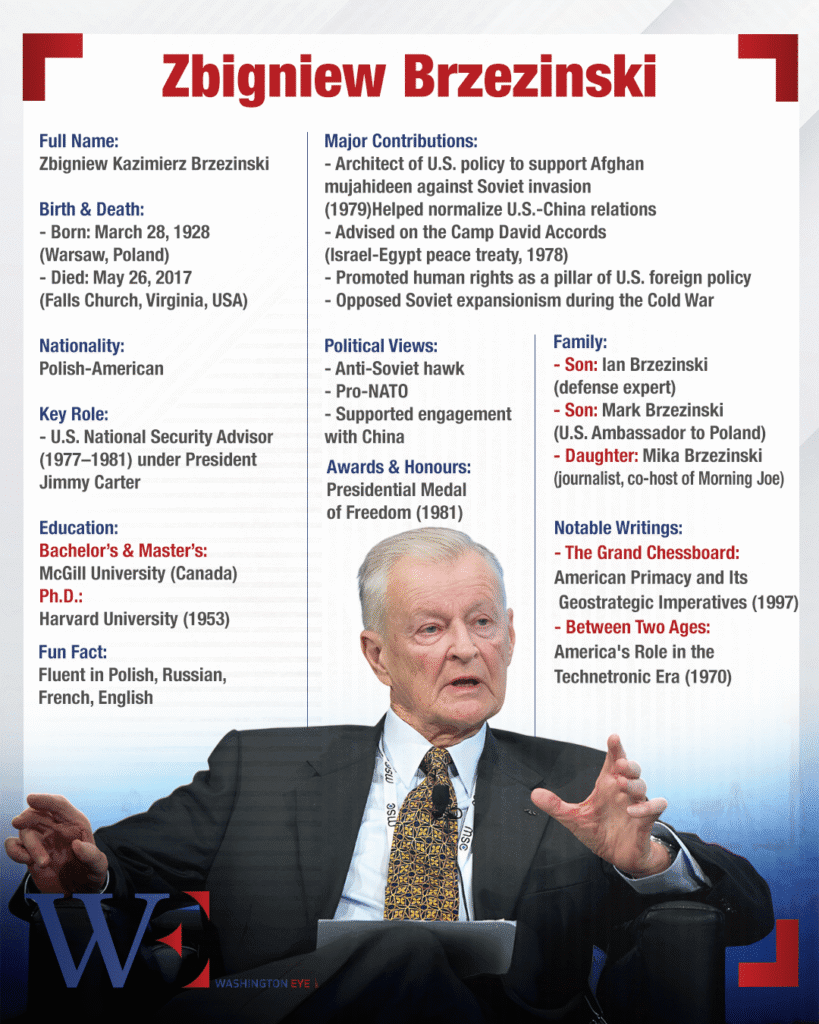In Zbig: The Life of Zbigniew Brzezinski, America’s Great Power Prophet, Financial Times columnist Edward Luce delivers a richly detailed and often provocative portrait of one of the most consequential yet divisive national security advisers in modern U.S. history. Brzezinski, the Polish émigré who served as Jimmy Carter’s top strategist during a turbulent presidency, emerges in Luce’s telling as a sharp-edged realist who saw American decline not as a condition to be managed, but a trend to be reversed—preferably through bold, sometimes abrasive, action.
Brzezinski’s background set him apart from the U.S. foreign policy establishment. Born in Warsaw, raised in Canada, and hardened by the traumas of war and exile, he brought to Washington a geopolitical urgency few of his contemporaries shared. As Luce reports, Brzezinski viewed Cold War ideological battles through the lens of lived experience: where others saw détente, he saw rot in the Soviet system—and an opportunity to accelerate its collapse.
A Presidency in Crisis, a Vision in Focus
Though Carter’s administration is remembered for economic malaise, the Iran hostage crisis, and political defeat, Luce’s biography makes the case that its foreign policy accomplishments—many shaped by Brzezinski—were pivotal. Under Brzezinski’s guidance, the U.S. normalized relations with China, helped broker peace between Egypt and Israel, and armed the Afghan mujahideen after the Soviet invasion of 1979. These moves, though fraught with long-term consequences, reflected a coherent worldview: American strategic preeminence must be maintained, not merely defended.
Luce notes that Brzezinski clashed with Carter’s moralistic tendencies, particularly when it came to dealing with authoritarian regimes. But he also documents how deeply involved Brzezinski was in pivotal events—from advising on the Camp David Accords to coordinating with Pope John Paul II during the hostage crisis in Tehran. Their shared Polish background and mutual fluency in the language helped forge a channel between Washington and the Vatican, with real consequences for Soviet influence in Eastern Europe.
Brzezinski vs. Kissinger: A Battle of Grand Strategies
Perhaps the most illuminating thread in Luce’s biography is the rivalry between Brzezinski and Henry Kissinger. While both were foreign-born intellectuals who ascended to the pinnacle of American policy-making, their outlooks could not have been more different. Kissinger, shaped by his experiences as a Jewish refugee from Nazi Germany, was a conservative realist who accepted Soviet power as enduring. Brzezinski, by contrast, believed that Soviet decline was inevitable—and should be hastened.
This ideological divide had real policy implications. Where Kissinger pursued stability through détente, Brzezinski sought transformation through pressure. Luce distills the difference succinctly: Kissinger feared chaos; Brzezinski saw opportunity. Carter’s White House, more pragmatic than its image suggested, allowed Brzezinski to push the U.S. toward a more assertive anti-Soviet stance—one that would prefigure Reagan’s escalation in the 1980s.
Principles, Pragmatism, and Post-Cold War Disillusion
In the decades following Carter’s presidency, Brzezinski remained a vocal and often contrarian presence in U.S. foreign policy debates. He broke party lines when principles dictated: backing George H.W. Bush in 1988, denouncing the Iraq War under George W. Bush, and endorsing Barack Obama in 2008—though his hawkish stance on Israel strained relations with the Obama campaign. The intellectual independence that made him valuable in the Carter years increasingly marked him as an outlier in a polarized era.
Luce’s account gives special weight to Brzezinski’s alarm at the strategic incoherence of the Trump administration. In March 2017, just two months before his death, Brzezinski warned: “A major country like the United States has to have a broadly conceived program for effective international action… I see nothing of the sort emerging from the administration and least of all from the president.”
It was a sobering epitaph from a man who had spent his life urging the U.S. to act deliberately on the world stage.
A Final Note: Implications for Today’s Geopolitics
Luce’s Zbig is not just a historical biography—it is a commentary on the bankruptcy of modern strategy. Brzezinski, for all his flaws and aggressiveness, insisted on thinking in terms of grand strategy. In an era when foreign policy is increasingly reactive, performative, or domestically driven, his approach is a stark reminder of what strategic clarity can—and must—look like.
As U.S.-China rivalry deepens, Russia wages hybrid warfare, and the Middle East stands on multiple fault lines, Brzezinski’s legacy challenges us to reject passive containment in favor of purposeful statecraft. Luce’s book, drawing from unprecedented access to Brzezinski’s diaries and papers, captures a man whose vision, however abrasive, was rooted in discipline and coherence—qualities that modern democracies would do well to rediscover.

















